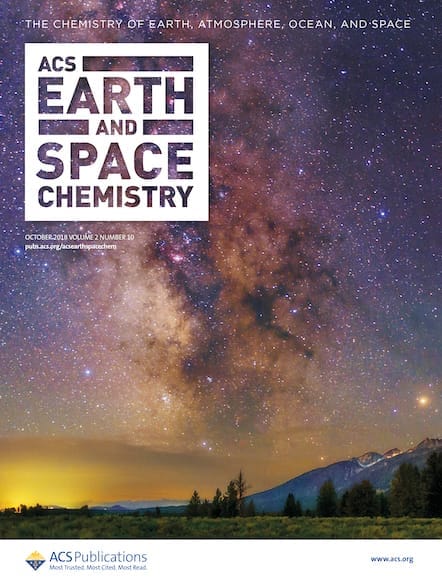ACS Publications and Editor-in-Chief Professor Joel Blum launched ACS Earth and Space Chemistry in 2017 to provide the community of scientists working in various earth and space chemistry fields. The journal focuses on the broad areas of high- and low-temperature geochemistry, atmospheric chemistry, marine chemistry, planetary chemistry, astrochemistry, and analytical geochemistry. It offers a new […]

ACS Publications and Editor-in-Chief Professor Joel Blum launched ACS Earth and Space Chemistry in 2017 to provide the community of scientists working in various earth and space chemistry fields. The journal focuses on the broad areas of high- and low-temperature geochemistry, atmospheric chemistry, marine chemistry, planetary chemistry, astrochemistry, and analytical geochemistry. It offers a new forum for publishing high-quality, innovative, multidisciplinary research in these exciting fields.
“This journal fills the void between the field of chemistry and the earth and space sciences,” says Professor Blum. “We embrace the highly interdisciplinary nature of this area of scientific exploration while emphasizing chemistry and chemical research tools as a unifying theme. A continuing trend for research in the earth and space sciences is increased collaboration between traditional scientific disciplines to understand complex natural systems better. Five editors mediate the peer-review process with expertise covering this breadth of disciplines and by an editorial board of 34 researchers.”
Why Publish Your Research in ACS Earth and Space Chemistry?
- Journal of the American Chemical Society (JACS) (established: 1879; 2020 Impact Factor: 15.419)
- Analytical Chemistry (established: 1929; 2020 Impact Factor: 6.986)
- Environmental Science & Technology (established: 1967; 2020 Impact Factor: 9.028)
- ACS Sustainable Chemistry & Engineering (established: 2013; 2020 Impact Factor: 8.198)
- Environmental Science & Technology Letters (established: 2014; 2020 Impact Factor: 7.653)
“We are pleased with the positive response we have received from the earth and space chemistry research community, and we thank both the authors and the reviewers who have supported the journal from its inception,” says Professor Blum.
A few statistics from the four-and-a-half years ACS Earth and Space Chemistry has been publishing:
- It received an Impact Factor of 3.475 according to the 2020 Journal Citation Reports® from Clarivate Analytics.
- The journal has published over 50 issues and more than 7,000 journal pages.
- Its median manuscript processing time is 10 weeks from receipt to acceptance.
- The journal is global: Its top five countries (by the number of manuscripts published) are the U.S., China, France, the U.K., and Canada.
When you publish your research with ACS Earth and Space Chemistry, you get:
- Active researchers as editors: Each of the five editors on the journal’s editorial team are active, senior researchers.
- High-quality, rapid peer review: ACS Earth and Space Chemistry follows the thorough peer-review process that ACS Publications has honed over more than a century of scientific publishing. Its editors are committed to ensuring rapid and rigorous review.
- Non-profit publisher: ACS Earth and Space Chemistry is published by the American Chemical Society, which was founded in 1876 and has 157,000 members, making it the largest scientific professional society. It is a not-for-profit organization, and all revenue from publications is used to benefit the society and its members.
- Open-access options: Publish open access in any ACS journal and choose from various licensing types to meet your funder and institutional mandates.
- Rapid processing: Facilitated by the ACS Publications’ state-of-the-art digital publishing platform. ACS is dedicated to advancing science and serving scientific researchers’ needs. ACS Earth and Space Chemistry’s median manuscript processing time is 10 weeks, from submission to acceptance.
- A connection to the global scientific community: ACS may be called the American Chemical Society, but it has members, editors, authors, and readers across the globe. ACS Earth and Space Chemistry has Associate Editors based in the U.S., China, and Europe.
Publish your research in ACS Earth and Space Chemistry.
How to Submit Your Research to ACS Earth and Space Chemistry
If you’re doing innovative research across the broad spectrum of high- and low-temperature, geochemistry, atmospheric chemistry, marine chemistry, planetary chemistry, astrochemistry, and analytical geochemistry, Professor Blum and the rest of the ACS Earth and Space Chemistry editorial team invite you to submit your next manuscript to the journal.
“We are pleased with the strong overall performance of ACS Earth and Space Chemistry. Nevertheless, we see considerable room for growth in the number and breadth of manuscripts that we can handle, and we encourage additional submissions,” says Professor Blum. “We would like to see a healthy balance between the scientific domains that we publish in, and so in the future, we especially hope to increase submissions focusing on high-temperature geochemistry, marine chemistry, and analytical geochemistry.”
The ACS Earth and Space Chemistry scope includes:
Earth Interior
- Mineral-melt phase equilibria, partitioning, and kinetics
- Mineralogy and mineral physics
- Igneous and metamorphic petrology, petrogenesis, and geochronology
Earth Surface
- Mineral-microbe-water reactions, thermodynamics, and kinetics
- Soil and water chemistry
- Reactive transport modeling and colloid transport
- Multiscale science and scaling of geochemical and biogeochemical reactions
Atmosphere
- Atmospheric composition and reaction pathways
- Chemistry-climate interactions
- Biogeochemical cycles
Ocean
- Chemical fluxes and marine trace element chemistry
- Effects of global change on marine chemistry and the cryosphere
- Chemistry of the paleo-environment
Space
- Chemistry of planetary atmospheres and surfaces
- Investigations of meteorites and tektites
- Properties of cometary and interstellar materials
- Spectroscopy and chemistry of stars, interstellar clouds, and planetary formation
Analytical
- Analytical methods for characterization of Earth and Space materials
If you have a question about whether your research fits in the journal’s scope, please send a pre-submission inquiry to eic@earthspacechem.acs.org.
How to Access ACS Earth and Space Chemistry
Institutional subscribers to ACS All Publications, All Access, and token packages have access to all ACS Earth and Space Chemistry articles. We encourage librarians at subscribing institutions to add ACS Earth and Space Chemistry. You can also email your ACS Publications sales representative with any subscription questions related to this journal at acspusbssales@acs.org.
